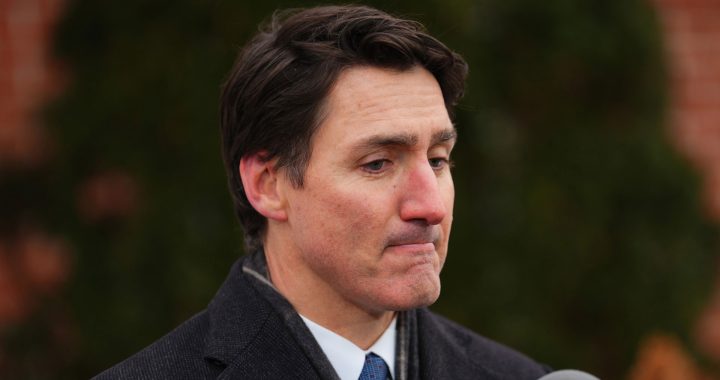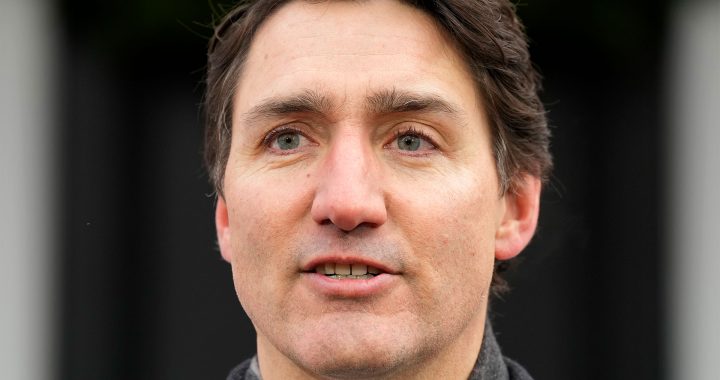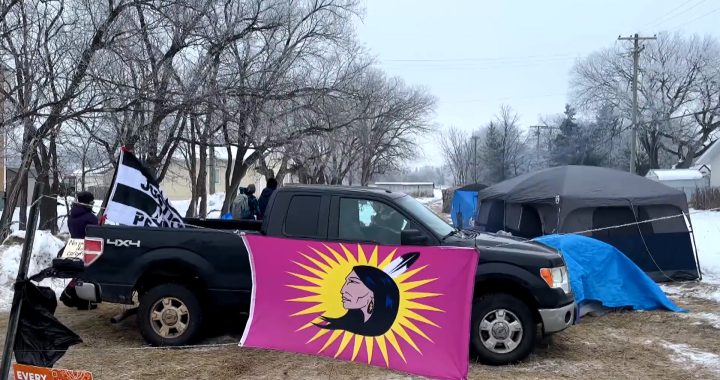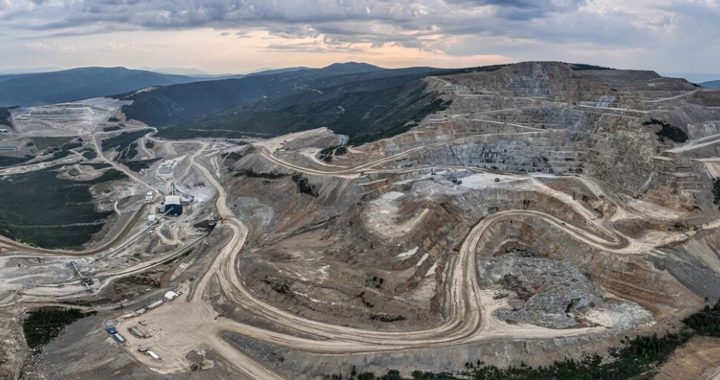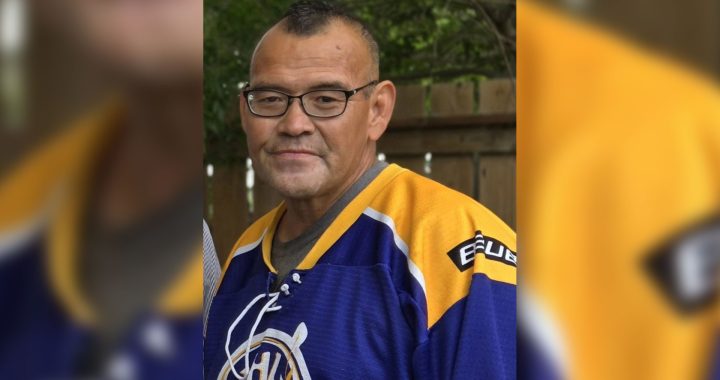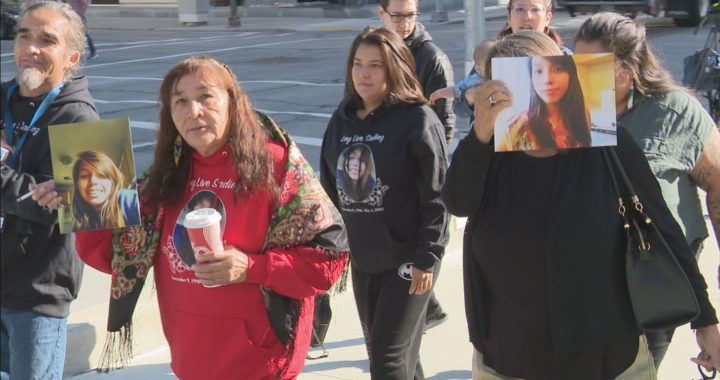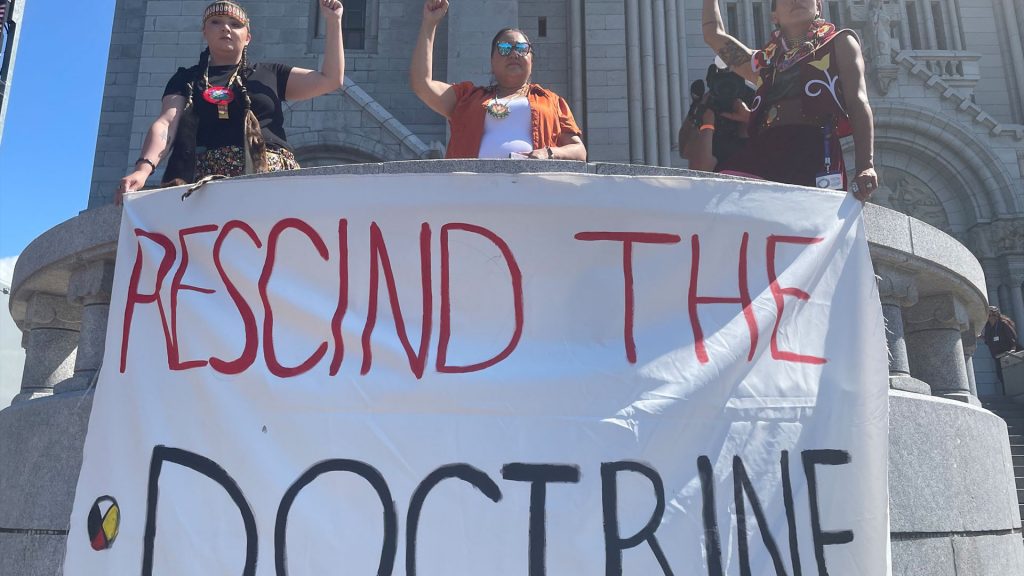
Chelsea Brunelle, left, her mother Kim and Sarain Fox hold up a banner outside the cathedral in Sainte-Anne-de-Beaupré. Photo: Emelia Fournier/APTN.
First Nations leaders and survivors are scheduled to sit down with the Catholic Conference of Canadian Bishops (CCCB) in Quebec City on Thursday to discuss how to settle outstanding issues between First Nations and the Catholic Church.
The invitation was sent to Assembly of First Nations (AFN) National Chief RoseAnne Archibald and regional chiefs from Archbishop (Richard) Smith on behalf of Mandy Gull- Masty, grand chief of the Cree Nation in Quebec, “in collaboration with” Chief (Gerald) Antoine, and Chief (Ghislain) Picard.
According to the invitation, the two sides will discuss: “Full acknowledgment and responsibility for the role of the Catholic Church in the spiritual, cultural, emotional, physical, and sexual abuse of First Nations children in Catholic-run residential schools; Full access to church records and documents; and compliance with the Roman Catholic Church financial obligations of the Indian Residential Schools Settlement Agreement (IRSSA); repudiation and replacement of Papal Bulls such as the Doctrine of Discovery terra nullius; repatriation of First Nations traditional objects from the Vatican; and authentic healing and reconciliation.”
Gull-Masty told APTN News this is a good time to push the bishops on these issues.
“We’re going to really try to identify how we understand our requests to be viewed and I think, try to put that pressure too to say, ‘Look, what kind of measures are you going to take?’ It’s very clear that the Pope has made a message, he wants to see reconciliation, he wants to see the next steps,” she said.
“How are you going to follow what he has made as a very strong statement for the church?”
The invitation, obtained by APTN, said there is room for 60 people for the event marked as a “political dinner” in the subject line, to sit down with the head of the CCCB.
The leaders are asked to identify “political delegates (First Nations leadership, survivors, technicians, or others) to attend who have a passion for this discussion and who can advance the agenda priorities in your region.”
It’s not clear who has been chosen attend the dinner which is listed as a “private event.”
“I think everyone is of the opinion that the papal visit is something exceptional, some say historic, and I think it’s the actions taken by the church that will contribute to eventually determining if this is a historically significant moment,” said Ghislain Picard, regional chief of the Assembly of First Nations for Quebec and Labrador.
“The meeting tonight is maybe an opportunity to discuss more political subjects that go beyond what is expected of Pope Francis, that is the official apology from the Roman Catholic Church.”
Two women unfurled a banner at the beginning of Pope Francis's mass this morning. The message? Rescind the doctrine. @APTNNews pic.twitter.com/JSLty6sriw
— Tom Fennario (@tfennario) July 28, 2022
The list of issues to be debated on the invitation includes almost everything left out of the Pope’s apology in Maskwacis on Monday and again Thursday in Quebec City.
While some accepted the Pope’s words when he said “I am sorry” for the ways many church members “co-operated, not least through their indifference, in projects of cultural destruction and forced assimilation promoted by the governments of that time, which culminated in the system of residential schools,” others were not as forgiving.
Former Truth and Reconciliation Commission chair Murray Sinclair released a statement that said Pope Francis’ offering of sorrow and shame leaves a “deep hole” by blaming individual members for the abuses of residential schools, not the institution itself.
“It is important to underscore that the Church was not just an agent of the state, nor simply a participant in government policy, but was a lead co-author of the darkest chapters in the history of this land,” Sinclair said.
“It was more than the work of a few bad actors — this was a concerted institutional effort to remove children from their families and cultures, all in the name of Christian supremacy.”
But Gull-Masty said that the Pope has opened a window.
“What the pope is doing, he’s taking something, a subject that many Canadians were not even aware of, and he’s escalating it, he’s scaling it up to an international level,” said Gull-Masty. “And so many people are going to have questions, and I think that it’s really going to create a sense of responsibility and accountability on the part of the local diocese here in Canada.”
The invitation said 20 to 25 leaders from Quebec, five to 10 from Atlantic Canada, 10 to 15 from Ontario and another 10 to 15 from all other regions of the country were invited.
Each region is to choose its delegates.
The invitation noted that the Pope will not be in attendance.
Read More:
Road to Truth: The Pope’s Visit
According to a release from Prime Minister’s Office, Justin Trudeau also discussed the issues many are anxious to see addressed by the Vatican.
A statement from the PMO said Trudeau “discussed the importance of the Roman Catholic Church’s continued meaningful engagement with First Nations, Inuit, and Métis in advancing healing and reconciliation.
“They also discussed the need for the Church to take concrete action to repatriate Indigenous artifacts, provide access to residential schools documents, address the Doctrine of Discovery, and ensure justice for Survivors, including for the Rivoire case.”
With files from Paul Barnsley, Shushan Bacon, Emelia Fournier, Brett Forester and Mark Blackburn
Editor’s Note: The original story stated that Grand Chief Gull-Masty sent the message. That was incorrect. The message was sent by Archbishop Richard Smith. We apologize for the error.




